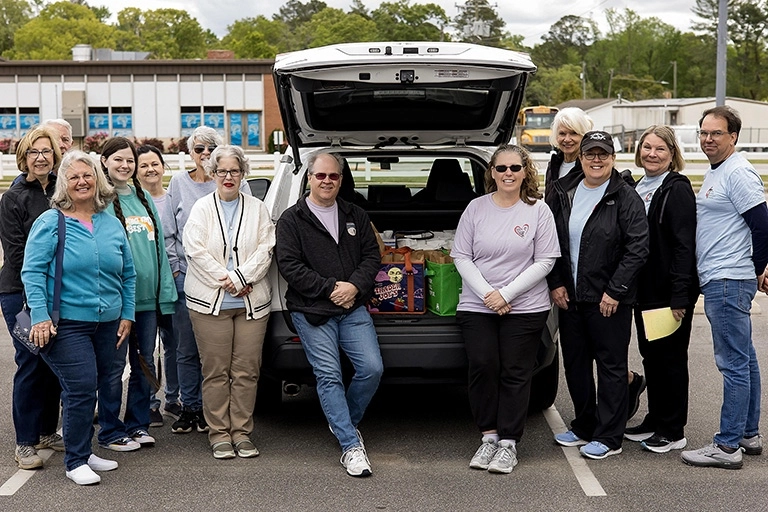

The Rev. Mark Gustafson
Grace United Methodist Church
The Rev. Mark Gustafson
Grace United Methodist Church
Centered in community: the future of congregations
What should the church of the future look like?
The Rev. Mark Gustafson believes it should look a lot like the early Christian church, tightly focused on getting out into the community to serve and support neighbors.
He is putting that belief to the test as he leads one of the new United Methodist congregations in North Carolina that are sprouting from the ashes of the denomination’s recent schism, which unfolded over several years and was officially finalized at the denomination’s 2024 General Conference.
The aftershocks from the breakup, sparked by fights over sexuality and theology, have radiated through communities across the nation. Most United Methodist congregations in rural Bladen County, N.C., voted to leave the denomination. One of the three led by Gustafson left; another lost a sizable chunk of members and a third stayed put in United Methodism. One exiting congregant questioned if the pastor was a true believer in Jesus Christ.
“It was an awful time,” Gustafson recalled.
Fast forward several years, and he now leads a hopeful new church called Grace United Methodist, one of a handful that the United Methodist conferences are planting in “church deserts” left by departing North Carolina congregations. The Endowment supports the effort through two five-year, $5.25 million grants given to the state’s United Methodist conferences in 2023. The funding is intended to allow the churches to explore new and creative ways of doing ministry.
Early results for Grace look encouraging. Gustafson said Grace reflects the community, including African Americans as well as whites, gay people as well as straight. The church’s 50 or so members are intently focused on community outreach. Taking the biblical admonition to love one’s neighbor seriously, Grace stages regular food giveaways, school supply drives for teachers and seminars for the elderly on subjects such as navigating Medicare benefits.
“We’re in the process of building something new,” Gustafson said. “It’s a beautiful place to worship and to be.”
One overcast weekend, he joined congregants for “Super Sandwich Saturday,” a monthly door-to-door distribution of 100-plus homemade sandwiches.
“Hello!” he shouted as one woman opened the door. “We’re doing the sandwiches again!”
“God bless,” the woman said as she accepted one. “I’m going to make it down there to see y’all at the church.”

“Awesome,” he said. “Have a great day!”
Gustafson later recalled that when the church first started delivering sandwiches to the apartment complex, the woman had a ‘No Soliciting’ sign on her door. Now, she reports that Grace’s members are the only people for whom she’ll answer the door.
The sandwich giveaway has made member Patty Scotten a familiar and welcome face in the community. It wasn’t always that way, she recalled. Months ago, one resident rudely refused the sandwiches as being “for poor people,” and predicted that drug addicts and dealers in the low-income apartment complex would accost church members.
Grace’s members weren’t deterred. As the distribution wound down one recent Saturday, Scotten pressed a wadded bill into Gustafson’s hand.
An offering for the church, she told the pastor. It was from the sandwich refuser.
Robert Webb, head of the Endowment’s Rural Church program area, said the aftermath of the disaffiliation debates left a unique opportunity to test new forms of ministry. As Grace and other churches explore these new forms of ministry, denominational leaders are preparing to study the results so that innovative and effective practices can be shared across the denomination.
“Our founder, James B. Duke, always believed United Methodist churches played a critical role as social and economic anchors in rural communities,” Webb said. “Grace and other congregations like it are showing just how right he was.”
Our founder, James B. Duke, always believed United Methodist churches played a critical role as social and economic anchors in rural communities. Grace and other congregations like it are showing just how right he was.

ROBERT R. WEBB III
Director of Rural Church
The Duke Endowment






